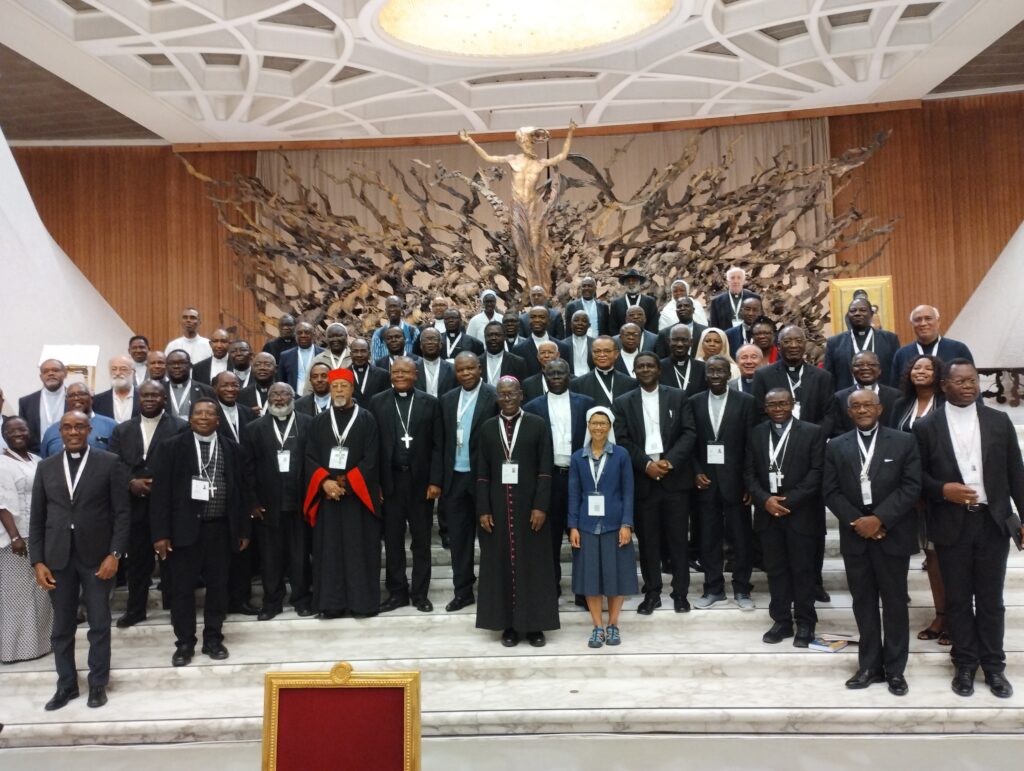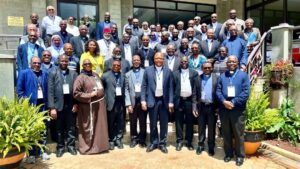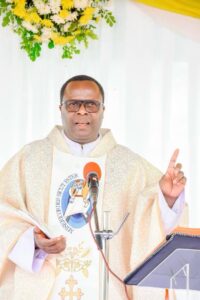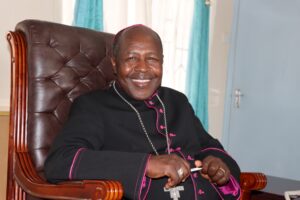VATICAN SYNOD: The Synodal Assembly, a School on Synodality and a Learning from Universal Church

Fr. Andrew Kaufa smm
The Synod Assembly which started on October 4, 2023, comes to an end this week, with the closing Mass at Saint Peter’s Basilica on Sunday, October 29. As people await the synthesized document of the contributions from working groups and personal interventions, some are asking whether answers are now ready to the question that they raised. For sure, they should expect the answers to be something like ‘No decisions have been taken out of this gathering’. Nevertheless, what will the participants take home from this 25-day hard work in Rome?
In my opinion, there are three takeaways. Firstly, the assembly was in itself a school about being synodal. Secondly, there is a lot that institutions of Religious Life and conferences have exchanged, thanks to Pope Francis who thought it was to make the synod all-inclusive. And thirdly, there are some things that the old Church and the young churches can exchange and enrich one another from the ecclesiological point of view.
Participants are Now Graduates of Synodality
“Journeying together is good but not easy, said Pope Francis at the opening session of the 16th Ordinary General Assembly of the Synod on Synodality, October 4, 2023, adding that it is not a parliamentary meeting but a journey with the Holy Spirit.
“I get a sense that we are already in this synodal journey. This is the overall spirit of nearly everyone here. There is that atmosphere of joy as much as there may be some tensions here and there. Above all, there is really an atmosphere of joy, an atmosphere of being in this journey together,” said Sheila Pirez a participant and Secretary to the Informati0n Commission during a press briefing on October 6, 2023.
In fact, the expectation that was set by Pope Francis at the opening session, on October 4, was that “Synodality is an expression of the Church’s nature, her form, style and mission.”
This was expressed in different terms by an expert facilitator, Prof. Anna Rowlands, who noted that communion is the beauty of unity in diversity, in concrete and tangible realities, where all participate because it is tied to the other across time and space.
“Leave no one behind,” said Pope Francis to emphasize the inclusive nature of journeying together in the synodal Church. And this is indeed something which all participants have appreciated. For the first time, the 16th Ordinary General Assembly of the Bishops on synod on synodality included priests, laity, youth, and Consecrated men and women.
Coming back to synodal education, it is evident that the exchange of diverse experiences among the participants who came from all continents was itself very enriching. Sharing their faith as Catholics while looking for answers to some pertinent pastoral issues that came from the conferences, the participants had an opportunity to learn that things in the universal Church are not uniform but diverse.
Pope Francis, during the opening speech, mentioned that being a participant in this assembly was both a gift from God and a responsibility to the Church that every participant was representing. Even their freedom to speak and to be listened to had to be understood from this perspective that they are not in the synod as individuals to push for their personal agenda, but rather as members of a family that is diverse.
“I came here to encourage you to take this synodal process seriously and to tell you that the Holy Spirit needs you. It is true: the Holy Spirit needs us. Listen to him by listening to each other,” continued Pope Francis.
And then, the methodology of spiritual conversation which has been followed at all levels of the synod on synodality has been a course of its own. Dialoguing in a prayerful mood; starting the assembly with a three-day retreat on the Transfiguration, conducted by an expert in the person of Fr Radcliffe – all these were an experience of its own for many participants, especially the laity.
The global experience as they prayed and listened to the experiences of one Church after another made the synod assembly a moment to appreciate listening silence, and spiritual discernment. The ingredients were just too many adding to one thing: learning to journey together with Jesus towards Jerusalem.
Siu Vai Vanessa Cheng, in his personal testimony about the assembly, on October 9, said: “Having assisted two synodal processes, that of the Diocese of Hong Kong and that of the Focolare Movement worldwide, I was able to witness that “Synodality” brings hope to people willing to “walk together,”
Church Leadership Style
As the assembly followed the Intrumentum Laboris, discussions in section B reveal that reports from the continents ask for some re-alignment to the Gospel on the exercise of authority in the Church. The testimony of Bishop Alexandre in the context of examining the subject from the perspective of the bishop’s office reads:
As a newly ordained bishop, he had to make a bold decision on a Church property whose history goes back to the 13th century, in order to address the financial problems, he found in the diocese. Instead of doing it alone, he decided to apply the principle which says, “What concerns everyone must be examined by everyone” hence the involvement of groups of Christians including women but also the priests, deacons, and Religious men and women.
Apparently, the participants are in unison that a synodal way of governance and administration calls for servant leadership, a style already endorsed by Jesus Christ in the Gospel according to John (13:2-17). This, the assembly expressed, calls for mindset change so that leadership in the synodal Church becomes more consultative.
The reaction of the Religious men and women participating in the synodal assembly shows that those in Consecrated Life have something to offer to dioceses in the conferences. This is taken from a few who expressed that in Religious Life, the principle is: ‘What concerns everyone must be examined by everyone’.
Sr Mary Teresa Barron OLA, a participant representing the International Union of Superior Generals (UISG) said that in fact, most Religious congregations are already doing it either because it is required either by virtue of spirituality and charism or by the type of formation which is given on leaders in community life and in the office of the Provincial and Superior General. Following the principle, every member of a community or Province who will be affected by the decision must be involved in the decision-making process.
This was further underscored by Bro, Ernesto Sanchez, Superior General of the Marist Brothers (FMS) who shared in private that the practice of regular community meetings provincial and chapters in Religious life already takes care of the quest for listening, dialogue, and participation. Apart from formation, the dynamics of discernment also include the creation of room for more consultation at the continental and universal levels through the chapters.
Young and Old Churches
One thing that surprised African participants at the synod meeting was the observation from the reports that parishes in some parts of the Universal Church parish councils or financial committees do not exist.
Respond to the request for the establishment of these laity participatory structures, Archbishop Dabula Mpako of the Archdiocese of Pretoria, South Africa said during a press conference, “We are building synodality upon an experience we have already had,” through the Small Christian Communities ecclesiological way of being Church in Africa.
Another report on collegiality and Petrine authority said, “Synod is a process of discernment through listening to the signs of the times. There should always be respect for the dignity of every human being as created by God, particularly in the Church where every baptized person is a son or daughter in the family of God. Collegiality at local, regional, and continental levels is very important. The bishop of Rome animates the universal spirit of the Church: he needs a permanent commission on synodality to advise him.”
These are some of the examples drawn to underscore that the practice of the principle of collegiality in the Church is something that the experience of the Church in Africa can offer to the Church in other parts of the world. Interestingly, these are resolutions already made during the Second Vatican Council, which are yet to be. Implemented by some dioceses in the Western Church.
“On collegiality, what matters is to walk together: the Pope consulting with bishop through councils, bishops with the people of God and the priests and the laity so as to reach the Sensus Fidei,” reads part of the report.
Conclusion
The Synod assembly has unearthed some hidden wisdom that, if shared, can enrich the universal Church. In this it can be said that the Synod on Synodality is already bearing fruits, considering that churches are not at the same level but the will is there for more communion, mission, and participation of all the baptized.


